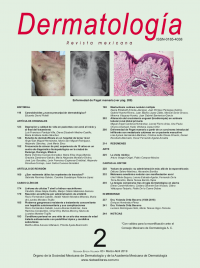Depression and quality of life in patients with acne at the beginning and at the end of the treatment.
Dermatol Rev Mex. 2019 marzo-abril;63(2):123-143.
Luis Francisco Pantoja-Villa,1 Diana Elizabeth Medina-Castillo,2 María Emiliana Avilés-Sánchez1
1 Especialista en Medicina Familiar, Unidad de Medicina Familiar 220, IMSS, Toluca, Estado de México, México.
2 Dermatóloga, práctica privada.
Resumen
OBJETIVO: Determinar el grado de depresión y la calidad de vida al inicio y al finalizar el tratamiento en pacientes con acné vulgar inflamatorio.
MATERIAL Y MÉTODO: Estudio prospectivo, descriptivo, longitudinal, que incluyó pacientes entre 12 y 20 años de edad con acné inflamatorio al inicio y al final del tratamiento, que acudieron a la consulta externa de Dermatología del Hospital General Regional 220 Toluca, Estado de México, durante 2015 y 2016. Se utilizaron dos instrumentos de medición: el CADI (Cardiff Acne Disability Index) para calidad de vida en pacientes con acné y la escala de Hamilton para la medir el grado de depresión.
RESULTADOS: Se incluyeron 50 pacientes, 28 eran mujeres, 41 pacientes tenían acné moderado y 9 pacientes acné severo. Al inicio del tratamiento de los pacientes con acné de tipo inflamatorio 28% no tenía depresión, 60% depresión menor y 12% depresión moderada. Al final del tratamiento se encontró sin depresión 64% y con depresión menor 36%.
CONCLUSIÓN: Se observó disminución de la depresión, que pasó de 28 a 64% de pacientes con acné de tipo inflamatorio que no tuvieron ningún grado de depresión al final del tratamiento.
PALABRAS CLAVE: Acné vulgar; depresión; calidad de vida.
Abstract
OBJECTIVE: To determine the degree of depression and quality of life at the beginning and at the end of treatment in patients with inflammatory acne vulgaris.
MATERIAL AND METHOD: A prospective, descriptive, longitudinal study was carried out including patients with inflammatory acne between 12 and 20 years of age at the beginning and at the end of the treatment, who attended the outpatient clinic of Dermatology of the Regional General Hospital 220 Toluca, State of Mexico, in 2015-2016. Two measuring instruments, the CADI (Cardiff Acne Disability Index) for quality of life in patients with acne, and the Hamilton scale for measuring the degree of depression were used.
RESULTS: Fifty patients were included, 28 were women, 41 patients had moderate acne and 9 patients had severe acne. At the beginning of treatment, 28% of patients had no depression, 60% had minor depression and 12% had moderate depression. At the end of the treatment 64% were found without depression and 36% with a minor depression.
CONCLUSION: It was observed a diminishment of depression from 28% to 64% of patients with inflammatory acne who had not any degree of depression at the end of the treatment.
KEYWORDS: Acne vulgaris; Depression; Quality of life.

